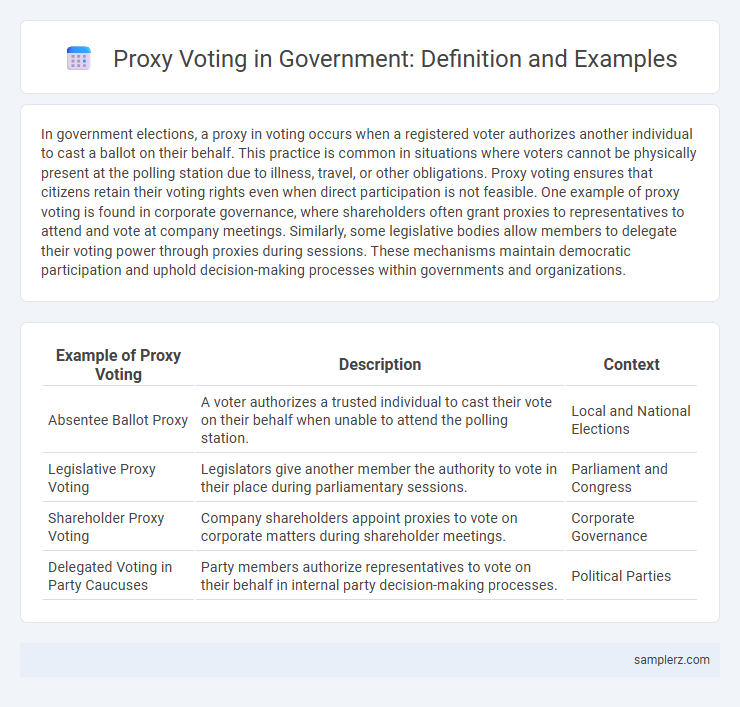In government elections, a proxy in voting occurs when a registered voter authorizes another individual to cast a ballot on their behalf. This practice is common in situations where voters cannot be physically present at the polling station due to illness, travel, or other obligations. Proxy voting ensures that citizens retain their voting rights even when direct participation is not feasible. One example of proxy voting is found in corporate governance, where shareholders often grant proxies to representatives to attend and vote at company meetings. Similarly, some legislative bodies allow members to delegate their voting power through proxies during sessions. These mechanisms maintain democratic participation and uphold decision-making processes within governments and organizations.
Table of Comparison
| Example of Proxy Voting | Description | Context |
|---|---|---|
| Absentee Ballot Proxy | A voter authorizes a trusted individual to cast their vote on their behalf when unable to attend the polling station. | Local and National Elections |
| Legislative Proxy Voting | Legislators give another member the authority to vote in their place during parliamentary sessions. | Parliament and Congress |
| Shareholder Proxy Voting | Company shareholders appoint proxies to vote on corporate matters during shareholder meetings. | Corporate Governance |
| Delegated Voting in Party Caucuses | Party members authorize representatives to vote on their behalf in internal party decision-making processes. | Political Parties |
Understanding Proxy Voting in Government Elections
Proxy voting in government elections allows a registered voter to authorize another individual to cast their ballot on their behalf, ensuring participation despite absence or incapacity. This system is regulated by specific electoral laws, which define eligibility criteria for proxies and the procedures for submitting proxy votes to maintain election integrity. Understanding proxy voting mechanisms is essential for comprehending how democratic processes accommodate voter accessibility and representation.
Legal Frameworks Governing Proxy Voting
Legal frameworks governing proxy voting vary significantly across jurisdictions, with many countries codifying proxy use through corporate law or electoral regulations. In the United States, the Securities and Exchange Commission (SEC) enforces the Proxy Rules under the Securities Exchange Act of 1934, ensuring transparency and fairness in corporate proxy voting. The United Kingdom's Companies Act 2006 provides detailed provisions on proxy appointments, requiring clear documentation and deadlines to validate proxy votes during shareholder meetings.
Common Scenarios for Proxy Use in Government Votes
Proxy voting in government commonly occurs during legislative sessions when elected officials are absent due to health issues, official travel, or emergencies. This practice ensures quorum maintenance and uninterrupted decision-making, allowing representatives to delegate voting authority to trusted colleagues. It is also frequently used in board meetings of public agencies to uphold operational continuity and comply with governance regulations.
Types of Proxy Arrangements in Political Decision-Making
Types of proxy arrangements in political decision-making include delegation, where a representative casts votes on behalf of constituents, and mandate-based proxies, which require strict adherence to voters' instructions. Another common arrangement is the discretionary proxy, allowing representatives to use personal judgment when voting. These structures ensure that elected officials maintain accountability and reflect the electorate's preferences effectively.
Advantages and Challenges of Proxy Voting in Governance
Proxy voting in governance enables shareholders or members to delegate their voting power to trusted representatives, enhancing participation rates and ensuring decisions reflect a broader consensus. This method reduces barriers caused by geographic distance or scheduling conflicts, promoting inclusivity and efficiency in decision-making processes. However, challenges include potential misuse of voting authority, dilution of direct accountability, and the risk of unrepresentative outcomes if proxies act contrary to original voter intentions.
Case Studies: Proxy Voting in Parliamentary Sessions
In parliamentary sessions, proxy voting allows elected representatives to delegate their voting rights to trusted colleagues when absent, ensuring consistent decision-making and legislative progress. Notable case studies include the UK Parliament's adaptation during the COVID-19 pandemic, which enabled remote proxy votes to maintain quorum and pass critical legislation. Similarly, the European Parliament has formalized proxy voting protocols, enhancing member flexibility while preserving democratic accountability.
Procedures for Appointing a Voting Proxy
Procedures for appointing a voting proxy typically require the voter to submit a formal proxy form specifying the proxy holder's identity and the scope of voting authority granted. Verification steps often include signing the proxy document in the presence of an authorized official or providing notarized evidence to ensure authenticity. These procedures safeguard the integrity of representation in government elections or decision-making assemblies.
Safeguards Against Proxy Voting Fraud
Proxy voting safeguards include mandatory identity verification and secure authorization processes to prevent fraudulent representation in government elections. Advanced biometric authentication and blockchain-based voting records enhance transparency and traceability, reducing the risk of proxy fraud. Regular audits and strict legal penalties further ensure the integrity of proxy voting systems.
International Perspectives on Proxy Voting Laws
Proxy voting laws vary significantly across countries, with nations like the United Kingdom allowing shareholders to appoint proxies under the Companies Act 2006, while the United States adheres to the Securities and Exchange Commission's proxy rules to ensure transparency and fairness. In Canada, proxy voting is regulated provincially, with British Columbia and Ontario enforcing strict disclosure requirements to prevent fraud. Emerging legal frameworks in countries such as India and South Africa emphasize digital proxy voting mechanisms to enhance accessibility and improve voter participation in corporate and governmental elections.
Impact of Proxy Voting on Democratic Participation
Proxy voting allows citizens to delegate their voting rights to a trusted representative, increasing participation among those unable or unwilling to vote directly. Studies indicate that proxy voting can enhance voter turnout by reducing barriers such as physical absence, disabilities, or time constraints. This method promotes inclusivity and strengthens democratic engagement by ensuring broader representation in electoral processes.

example of proxy in voting Infographic
 samplerz.com
samplerz.com